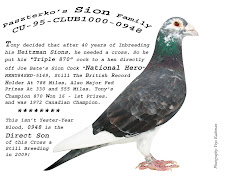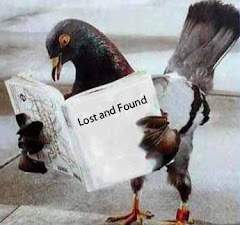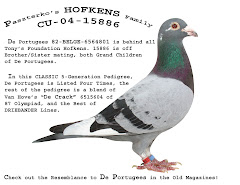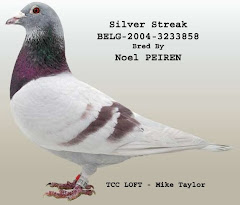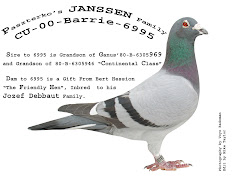Brian Moxey, elected "Life Time Club Member" of the Barrie Racing Pigeon Club, has always positively promoted our sport of Pigeon Racing to the general public. He has appeared in many newspaper articles, and is well known within his community. Hat's off to Brian!
This article first appeared in the 'Barrie Advance' in 1990. Brian lives in the heart of the City and has never had complaints from neighbours about his pigeons. If fact, neighbours have been keen to direct prospective fanciers to Brian.
A typical race day - Pigeon Racing
By Al Brown: Staff
The first two pigeons sweep in from the south and circle the back yard. Brian Moxey, seated nervously on his back porch, is concerned as they circle, then land and walk about the roof of the loft. "Its all costing me time", he says without taking his eyes off the birds. "This is one way to lose a race".
Finally, thankfully, the birds slip through the tunnel on the roof and into the loft. Moxey is off the back porch like Ben Johnson from the starting blocks. His hat flies off in the wind as he races to the loft. A moment late, more relaxed, he emerges from the loft and begins again to scan the skies looking for those birds yet to make an appearance. For all the care and hard work of raising and caring for racing pigeons, the actual race day excitement is over in minutes.
Every Saturday from May 5 to the first week of October, there are at least 20 pigeoners in Barrie locked in competition with each other and dozens of others around Ontario. The races vary in distance, but the inner workings and detailed rules and regulations remain the same. Racing birds from seven different clubs are sent via truck to various locations up north. The truck is provided by the Toronto Federation of Pigeon Clubs and every Friday goes north to places such as Sudbury, Timmins, Long Lac, Hearst and Burk's Falls.
The birds are released at 9:00 AM, Saturday, and the race begins. Now, however, is when it gets complicated. Unlike most races, there is no common finishing line. Each group of pigeons is headed for its own loft and all are located at different distances from the starting point.
Each bird is banded by the home club just before it is sent to the starting point. In the tunnel to the loft, meanwhile, a special clock timer complete with roll of adding machine paper and small drum is set to go. When the birds finally return to the loft, the pigeoner rushes in, takes the band off the bird, puts it into the clock timer box and pulls a lever to get a set finishing time. These times are then mailed to Mark Brown in St. Jacob's, Ontario. He is the only person authorized by the Canadian Racing Pigeon Union to measure for velocity and ultimately declare a winner.
He calculates the velocity of each bird based on the exact latitude and longitude of the release point, the home loft and the times registered. "A lot of things are figured in, even the curvature of the earth and how many seconds individual clocks are off", said Moxey, a long-time member of the Barrie Racing Pigeon Club. "The highest velocity wins the event".
As Moxey watches the sky, the last of his birds makes a graceful appearance. It has been about 20 minutes since the first two birds appeared. For Brian Moxey, and hundreds of other pigeon racers around Ontario, a full season of 38 races is just beginning.
Feeding time: Brian Moxey spends a great deal of time taking care of his pigeons. Feeding them is part of the daily job and all part of getting the best times from his flock.
Barrie Racing Pigeon Club:
35 years of tradition
The Barrie Racing Pigeon club is one of the oldest organized sports clubs in Barrie, yet it is also one of the least known. Founded about 35 years ago, the BRPC has a clubhouse on County Road 56, off Highway 90, and currently has about 20 members. Each week from May to October the BRPC gets together with other clubs from across Ontario to race some of the finest racing pigeons in the world.
Racing, however, is only a culmination of the hard work and effort each of the members puts forth throughout the year. "There is taking care of them (pigeons), exercising them and training them", said Brian Moxey, a member of the club for 25 years. "I like the spring when the youngsters are born and you have to attend to them."
Moxey is typical of most of the members. He got hooked on the sport many years ago and has gradually built up an impressive loft of racing birds. He has about 80 and continues to look for ways to upgrade his loft with better bloodlines. The pigeons, many of which can be quite expensive, are purchased at auctions and through other pigeon fanciers.
There are pigeon shows, young bird auctions, buy, trade and sell shows and many other ways to acquire new birds or better birds. It costs $10 a year to join the Barrie Club and a further $15 for membership in the Canadian Racing Pigeon Union. There are also additional costs such as truck fees for transporting the birds to starting points for the beginning of races.
Although it is a sport that only pigeoners seem to understand and enjoy, Moxey said the Club is always looking for new members. "Everybody is welcome to check it out," he said. "The sport is secondary to the birds and I think it's fair to say we (pigeoners) are all animal lovers first."
The competition side of things offers some fun and excitement, but pigeon racing is first done for the sheer love of animals. For more information, call Jerry Wegman, Club Secretary (also, elected Life Time Club Member).
It may not be a highly publicized or well-known sport, but pigeon racing is steeped in history and has more participants than most people realize. According to the book 'Pigeon Racing' by F.W.S. Hall, there is evidence the sport began 3,500 years ago. Pigeons were used by many Middle East nations and Roman lords such as Julius Caesar. The sport is now believed to be enjoyed by some 7-million people worldwide, and there are organized pigeon racing unions throughout Europe, Japan, China, Soviet Union, Australia, Canada and the United States.
In total, there are more than 150-million racing pigeons bred every year and these thoroughbreds of the pigeon world are certainly worth more then mere chicken feed. Prices ranging up to $50,000 have been paid for a single top racing bird. These top birds are well worth the price to pigeon racers. Racing pigeons can reach speeds of more than 60 mph and a few have been known, under ideal weather conditions, to surpass 90 mph.
The sport has reached such a level in Europe that one race in Britain offers prize money of about $125,000 to the winner, while another in France pays more than $140,000 to the winner. It may not be well-known, but not many sports can boast that somebody, somewhere in the world is participating in them on virtually every day of the year. Pigeon racing can make such a boast.
Racing, however, is only a culmination of the hard work and effort each of the members puts forth throughout the year. "There is taking care of them (pigeons), exercising them and training them", said Brian Moxey, a member of the club for 25 years. "I like the spring when the youngsters are born and you have to attend to them."
Moxey is typical of most of the members. He got hooked on the sport many years ago and has gradually built up an impressive loft of racing birds. He has about 80 and continues to look for ways to upgrade his loft with better bloodlines. The pigeons, many of which can be quite expensive, are purchased at auctions and through other pigeon fanciers.
There are pigeon shows, young bird auctions, buy, trade and sell shows and many other ways to acquire new birds or better birds. It costs $10 a year to join the Barrie Club and a further $15 for membership in the Canadian Racing Pigeon Union. There are also additional costs such as truck fees for transporting the birds to starting points for the beginning of races.
Although it is a sport that only pigeoners seem to understand and enjoy, Moxey said the Club is always looking for new members. "Everybody is welcome to check it out," he said. "The sport is secondary to the birds and I think it's fair to say we (pigeoners) are all animal lovers first."
The competition side of things offers some fun and excitement, but pigeon racing is first done for the sheer love of animals. For more information, call Jerry Wegman, Club Secretary (also, elected Life Time Club Member).
A little bit of history
It may not be a highly publicized or well-known sport, but pigeon racing is steeped in history and has more participants than most people realize. According to the book 'Pigeon Racing' by F.W.S. Hall, there is evidence the sport began 3,500 years ago. Pigeons were used by many Middle East nations and Roman lords such as Julius Caesar. The sport is now believed to be enjoyed by some 7-million people worldwide, and there are organized pigeon racing unions throughout Europe, Japan, China, Soviet Union, Australia, Canada and the United States.
In total, there are more than 150-million racing pigeons bred every year and these thoroughbreds of the pigeon world are certainly worth more then mere chicken feed. Prices ranging up to $50,000 have been paid for a single top racing bird. These top birds are well worth the price to pigeon racers. Racing pigeons can reach speeds of more than 60 mph and a few have been known, under ideal weather conditions, to surpass 90 mph.
The sport has reached such a level in Europe that one race in Britain offers prize money of about $125,000 to the winner, while another in France pays more than $140,000 to the winner. It may not be well-known, but not many sports can boast that somebody, somewhere in the world is participating in them on virtually every day of the year. Pigeon racing can make such a boast.
Taken from the Barrie Advance, Wednesday, May 9, 1990
There have been many changes to the local sport since this article appeared in the 'Barrie Advance' some 20 years ago, such as electronic clocking and the organization of the Up North Combine. And Al Brown stated only a few minor errors such as the reference of Mark Brown and the calculation of velocity. However, the Pigeon Racing story, and the meat and potato's of the sport was portrayed well.
Anyone interested in entering the sport anywhere in Canada can contact the Canadian Racing Pigeon Union.
(P) 519-842-9771
(F) 519-842-8809
Past sports promotions
Pigeon racing
Pigeon racing








